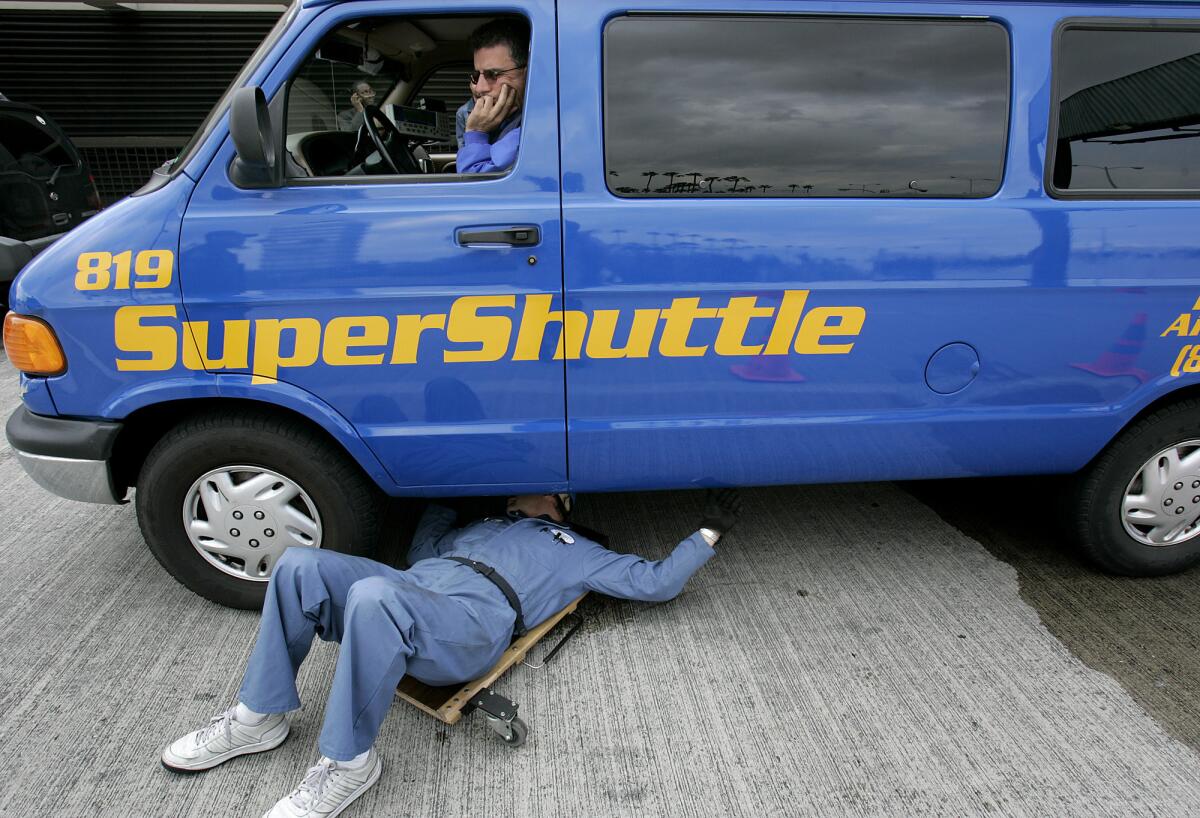SuperShuttle sues California to classify workers as contractors instead of employees

- Share via
SuperShuttle International was in the ride-sharing business long before Uber and Lyft. But like those Web-based companies, the airport shuttle provider is fighting to defend a business model that defines drivers as independent contractors, not employees.
SuperShuttle is embroiled in a long-running legal dispute with California, as the state grapples with the labor rights of this growing class of workers. A recent study by Princeton and Harvard economists found that contractors make up 8% of the U.S. labor force.
Like many employers, SuperShuttle started treating its workers like freelancers to help grow its business. The company has spent the last several years fending off lawsuits brought by drivers in California and five other states, who have contended that they were employees rather than independent contractors.
Drivers, who the company calls franchisees, lease or buy their own vans, which must be covered with SuperShuttle logos. They pay the company up to $40,000 over 10 years, in addition to $250 in weekly fees. They give the company 25% of their gross revenue.
The most critical battle for the company is its lawsuit against the state Employment Development Department, which forced SuperShuttle to pay employment taxes for drivers whom the state said should have been compensated like employees.
The EDD charged SuperShuttle more than $783,000 for failing to pay into state unemployment insurance and disability funds on behalf of drivers from 2006 through 2009. In 2014, SuperShuttle sued the EDD. The case is set to be heard in September.
“It’s not about the money. It’s about the EDD’s effort and desire to eliminate the independent contractor status in the state of California,” said Alan Moldawer, the general counsel for Transdev North America, the French transportation company that acquired SuperShuttle in 2006.
The company used to have employees, but turned them into franchisees in 2002 after taking a business hit in the wake of the 9/11 terrorist attacks. The new model helped SuperShuttle expand rapidly; its revenues increased from $35 million in 1997 to $340 million in 2015, according to a financial filing.
But in the last several years, Uber and Lyft have aggressively staked out a spot on SuperShuttle’s turf -- U.S. airports -- and eaten into the company’s business. Moldawer said that drivers were in favor of becoming franchisees a decade and a half ago, but that some of them are unhappy now because their business is suffering.
“We have more and more frustrated operators primarily because of the competition from unregulated competitors,” Moldawer said. The EDD declined to comment.
Drivers who have sued SuperShuttle say they have more fundamental problems with life as independent contractors.
Ravil Aysov, a Russian immigrant who drove for the company in San Francisco, said in court documents that he was often scheduled into 24-hour shifts and was fined $50 when he declined a ride if he was too tired or sick to drive. The company monitored his driving, berated him if he arrived late to a pickup, and would unilaterally cancel rides as a punishment for poor performance, Aysov said.
Paul Marron, SuperShuttle’s lawyer, said in an emailed statement that the company did not fine drivers if they were too sick to drive and that Aysov could have opted out of the system used to map drivers’ routes. The company can fine franchisees $50 if they cancel a ride that they had previously accepted.
“SuperShuttle made no effort to hide the rigors of their domination and control over our work,” wrote Aysov, who is one of five former drivers who brought a separate claim for back pay against SuperShuttle in front of the state’s labor commissioner.
SuperShuttle successfully sued Aysov and four other former drivers last year to block their claims, citing an agreement they had signed to arbitrate all disputes. The drivers have appealed that decision.
In 2014, the company settled a federal class-action suit in California brought by drivers who said they were actually employees. SuperShuttle paid the drivers $12 million, but maintained their freelancer status.
SuperShuttle has settled similar suits in New York, Florida and Minnesota. Denver is the only city where the company has shifted drivers back to employee status, after the National Labor Relations Board ruled that drivers could unionize in 2011.
But the company contends that the stakes in the EDD case go beyond just a six-figure refund from California taxpayers.
“It would threaten the continued viability of the business if our franchisees didn’t have any value, if they were converted to employees against their will,” Moldawer said.
Follow me @NatalieKitro on Twitter
More to Read
Inside the business of entertainment
The Wide Shot brings you news, analysis and insights on everything from streaming wars to production — and what it all means for the future.
You may occasionally receive promotional content from the Los Angeles Times.











